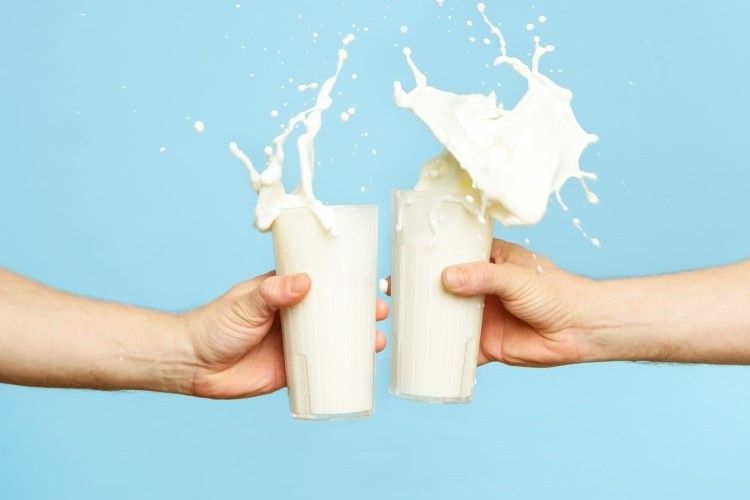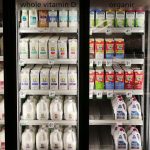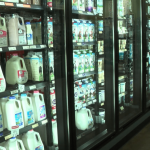
The largest US dairy co-op partnered with Good Culture to release Good Culture Probiotic Milk, a lactose-free, long-life milk fortified with the BC30 probiotic (Bacillus coagulans GBI-30, 6086).
The ingredient, which is added after the milk is UHT-treated, is said to support digestive and immune health when 12oz (around 350ml) of the product is consumed, with each 12oz serving providing one billion probiotic cultures. Good Culture Probiotic Milk is available as a whole and 2% fat varieties and will launch at select retailers on the East Coast this year, with plans for national expansion.
“Our product is the first-ever ultra-pasteurized milk with added probiotics,” said Rachel Kyllo, senior vice-president of marketing at DFA Dairy Brands. “While there are many gut-friendly products out there, few are in categories as widely present in consumer households as fluid milk. Many consumers do not like the taste-profile – often sour, tart, tangy – of fermented or cultured dairy products. Now, those consumers can enjoy the delicious taste and nutrition of dairy milk, while still benefiting from incorporating probiotics into their diet.”
Asked what evidence the co-op had on consumer demand for such a product, Kyllo added: “Our DFA Dairy Brands team conducted extensive qualitative and quantitative market research with milk consumers to validate their interest in a probiotic milk. Functional foods, especially those that support digestion and immunity, continue to be top-of-mind for consumers.
“Our DFA Dairy Brands R&D and Innovation teams have been exploring lactose-free, probiotic milk for several years, especially as gut-health and interest in lactose-free milks has continued to grow. The project became especially relevant as the COVID-19 pandemic accelerated consumer demand for products that can support immune health.”
“Milk is already part of the daily routine for many consumers, so adding probiotics to milk is appealing as an easy way to incorporate them into their lifestyle and diet.”
With research showing that Americans are most likely to drink milk with their breakfast, there’s one caveat – Good Culture Probiotic Milk shouldn’t be heated up beyond 158°F (70°C) as this could compromise its probiotic properties.
But Kyllo thinks there’s no cause for concern. “Our research found that the majority of milk occasions for consumers use cold products (poured over granola, in a glass, in a smoothie, etc.). So, while heating above 158° F could compromise the probiotic, it is still milk and OK to use in heated/cooking applications.”
In addition to being lactose-free and long-life, there’s a potential cost benefit for consumers, as ounce for ounce, the Good Culture Probiotic Milk could be cheaper than popular fermented beverages such as kefir and kombucha. “On a per-ounce basis, our milk with probiotics is significantly less expensive than kefir, kombucha, yogurt and probiotic supplements,” Kyllo claimed. “Because of this, Good Culture Probiotic Milk can appeal to a wider spectrum of consumers who may not purchase these other categories as frequently.”
On pricing, the DFA representative told us that the product will be priced at a premium compared to traditional fresh fluid milk but cost less compared to organic milks. “We are targeting dairy consumers interested in functional foods and beverages,” Kyllo concluded. “By partnering with Good Culture, a brand leader in gut health, and supporting the product launch with a robust consumer marketing campaign, we are confident this product will resonate with shoppers looking for functional milk products.”
Functional beverages – a lucrative market that keeps on growing
According to Research And Markets projection released in February 2023, the global functional beverages market is set to expand at a CAGR of 12.4% in 2023, reaching a valuation of $147.7bn this year compared to $131.47bn in 2022. The market, which is propelled by increasing consumer awareness around health and wellness, is expected to be worth $225bn in 2027.
“Consumers are increasingly shifting towards the consumption of functional beverages that contain ingredients to address these specific health issues,” Research And Markets explained in its report. “According to Packaging Strategies journal, a major change in the beverage industry is moving toward functional beverages as consumers strive to improve their health.
“Additionally, the rise of clean-label, organic, and non-GMO products is impacting the buying behaviours of consumers. Therefore, consumer preferences for functional drinks over carbonated drinks and fruit juices are projected to drive the demand for functional beverages over the next few years.”

























